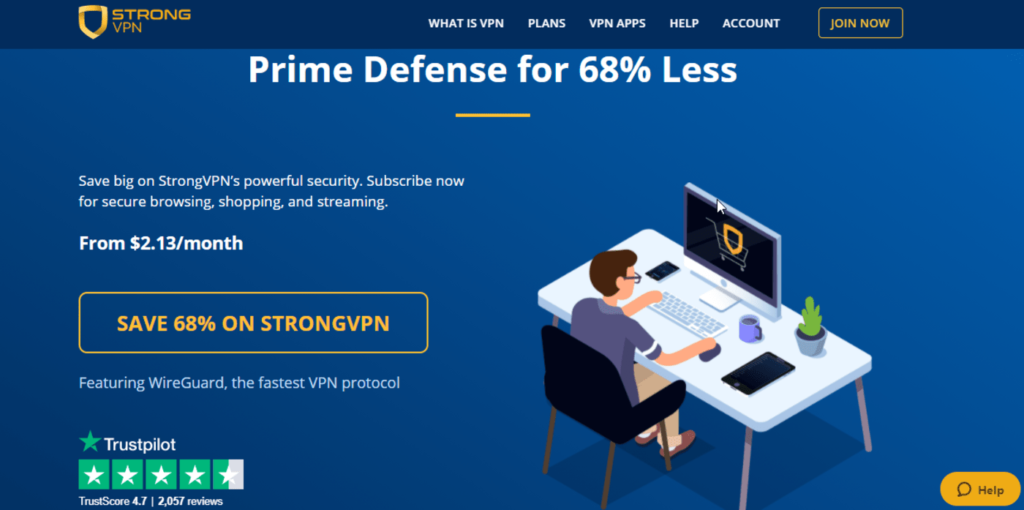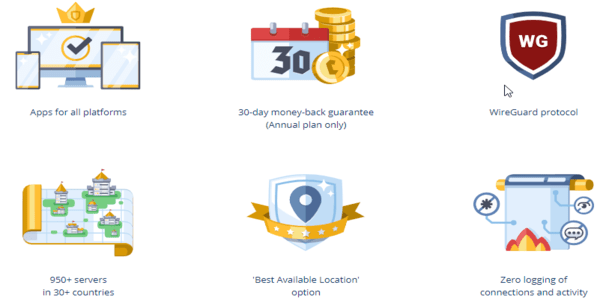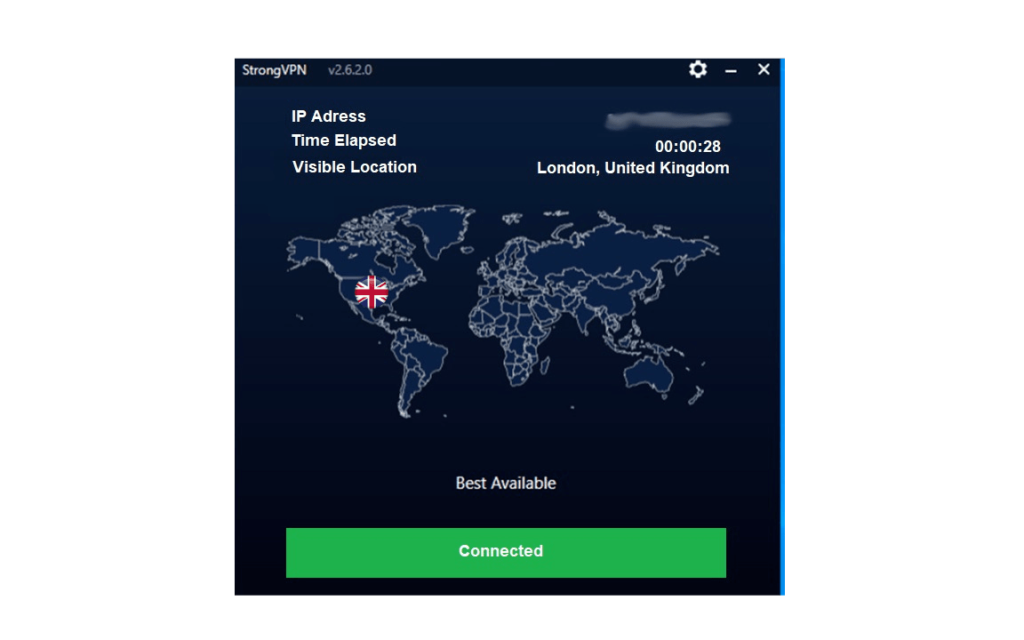Surprisingly, some of the oldest VPNs in the industry, such as StrongVPN, have a low profile.
Unfortunately, that status as a relative unknown is enough of itself to make any new prospective new user doubt a little.
StrongVPN’s history in the digital space is twice as long as the average. Consequently, you’d expect their product to be twice as good, wouldn’t you? Well, that logic doesn’t always hold, as you will see in this review.
StrongVPN has undoubtedly improved over the years, but it’s still not perfect, and some issues remain that could be (or not) a deal-breaker depending on your user type. Thus, I’d recommend getting a premium VPN like ExpressVPN instead, as that will prove to be a better choice in every aspect (more on it later).
In this article, I will review StrongVPN in full detail. Speed, customer service, unique features, compatibility, and other things with one sole goal in mind: I want you, the reader, to be able to answer the question “How strong is StrongVPN, in the end?” so that you can make an informed choice, guided by the bare facts.
StrongVPN key features at a glance
| Servers | 950 in 30+ countries |
| No-logs policy | Yes |
| Torrenting | Yes |
| Kill switch | Yes |
| Price | 2.13 USD/month for one year plan |
| Country-based | United States |
| Simultaneous devices | 12 |
| Customer support | 24/7 live chat support |
| Money-back guarantee | 30 days |
StrongVPN overview
Let’s start with a general panorama. StrongVPN is undoubtedly not among the top VPNs that come to mind when you think about the industry’s providers.
However, it’s easy to use, keeps no logs, boasts 950+ servers in over 30 countries, has decent customer support, allows torrents and P2P networks, and is suitable for Netflix; its encryption and VPN technology are the industry’s standards. In addition, it’s more than reasonably priced at 10.99 USD monthly (the average cost for this kind of service), and you can drive that cost down as low as 3.66 USD if you sign up for the yearly plan.
Background

The international nature of the internet and the ability to connect to websites and servers scattered worldwide in a heartbeat could lead you to believe that local conditions are not very important in internet services. You’d be right, for the most part too. But not when it comes to VPNs. Privacy laws vary significantly between jurisdictions, and the domestic legal environment surrounding your provider could affect you in the long run. So, where a VPN is headquartered matters.
Strong Technology LLC. was incorporated in 2005. The VPN is headquartered in Lake Tahoe, which is probably the last place you’d choose to base a VPN. Yet, it’s been there for more than two decades.
It’s, of course, inside the U.S.A., whose government’s lack of regard for citizen’s privacy was very well-known even before Edward Snowden brought it to the world’s attention.
The provider recently combined forces with another VPN named Encrypt.me. Both of the providers claim the merger aims to bring users superior features and VPN service. Existing Encrypt.me service customers can log in on the same domain, but new users looking to get a VPN service will need to register at the StrongVPN website.
Features
The network is comprised of more than 950 servers in 30+ countries. It’s decidedly not impressive at all since many top VPNs have thousands of servers based in more than three times as many countries. This is unfortunate because the number of nodes in a VPN matter, as well as geolocation.
Overall, compatibility is good. It works with Android, iOS, Mac, Windows, Apple T.V., and Routers. The help center is extensive and includes several instructional articles that can guide users to set up StrongVPN at home with a router. It’s compatible with T.O.R., too, if you are on the paranoid side of things.

StrongVPN has a kill switch, you can have 12 concurrent connections simultaneously, and it includes every primary connection protocol.
So everything looks peachy so far, right? So let’s dig a little deeper and find out.
Pros of using StrongVPN
It works with Netflix (so far)
Netflix hates VPNs, so it spends a lot of effort cracking down on them, proxies and unblockers. The streaming platform is pretty anal about this to the point that the international community is somewhat startled.
Over the last lustrum, Netflix has taken pride in defeating some of the best VPNs in the business at their own game.
Considering that, I expected my attempt to use Netflix through StrongVPN to fail miserably. My previous experience with this service was, after all, pretty lousy.
So I was shocked when I saw Netflix working from a U.S. server without any buffer delays.
Many of the best VPN services in the industry have not managed to circumvent Netflix’s blocking measures, so this little fact alone becomes a critical feature in StrongVPN’s functionality.
Good customer service (fast, helpful)
Customer service is rarely a “pro” in any VPN service. It’s even less likely when the VPN in question lacks live customer support.
However, it must be said that StrongVPN’s efforts regarding customer service are a hit.
For the purposes of this review, I concocted a support ticket in the afternoon, around 5 pm U.S.A. time. It was a made-up thing, for sure. Once I did that, I went about my usual business as I did not expect to have an answer until the following day if things were fast. So I was pleasantly surprised when no more than 30 minutes later, I found a reply asking me the right questions needed to address the issue.
I didn’t run into any problem I could call “worthy of customer service” as I gathered the information for this review. Still, that instance alone is enough to tell that StrongVPN’s customer support team is enthusiastic and professional.
Strong encryption and StrongDNS
The Equifax breach, one of digital security’s most significant security breaches, affected 143 million U.S. citizens. If you were one of them, the Equifax hackers could have your social security number, your legal name, home address, phone number, driver’s license number, and other critical data as you read this. In short: you could be targeted for total identity theft or fraud.
The dynamics in the breach remain unclear so far, but it’s known that it was a flaw in an Apache Struts at the exploit’s heart, which is a standard piece of software in use by many organizations, Equifax included.
The fact that the breach involves more than a hundred million people is impressive for sure. Still, the worst problem lies in the fact that US-CERT, a team within the U.S. Department of Homeland Security, had already identified the flaw in March 2017. That gave the Apache Struts developing team more than three months to address and fix the problem. They say they did. If they are telling the truth, their effort was not good enough, to say the least.
It’s still too early to know the real damage that this and other hacks have on society. But, at least these episodes bring the public’s attention to the fact that cyberterrorism is here, it’s real, and it can reach anybody. So people are starting to adopt better security practices online and be more hacker-aware.
The one thing anybody can do to be safer online is, of course, to join a paid VPN service. Yes, it has to be a paid service. While many free VPNs on the web do the trick, they collect your data to sell to third parties – they have to make money somehow, and, in this case, you are the product.
But while a paid option is always better than a free one, the fact is that not all sheep are equal. Some VPNs are better than others.
StrongVPN uses the standard encryption algorithm in the industry, A.E.S. It’s the encryption system used by the N.S.A., F.B.I., and C.I.A. This ensures that your data is scrambled and can’t be intercepted by anybody, even if you are the type of user who likes to connect to the web at Starbucks.
Logging policy
The irony in free VPNs is that they won’t keep you safer. On the contrary, using them is less secure. This is because they have the words “No logs” in big red letters on their websites, but then you have to read the small print. Many VPNs (not only the free ones) will let you know in small letters that they log your information and your activities and sell them to third parties and affiliates.
So the risk of getting your activity in logs is out there, which is why you need to make sure you know and understand a VPN’s logging policy before just going ahead and paying for a subscription.
And among StronVPN’s best points is the fact that they have a zero-logging policy. In other words, the site will keep a record of your email address, payment method, full name, credit card details, and billing address. Other than that, StrongVPN will not keep any logs of your activity at all.
So you have a VPN that works with Netflix, has excellent customer service, and keeps no logs. Sounds good so far. Let’s have a look at the other side of the coin.
StrongVPN’s cons
Slow speeds on most servers
As I mentioned before, I have used StrongVPN before, and I must say that the speeds available have improved dramatically in recent years. And that doesn’t mean they are any good yet.
The speed you get in StrongVPN makes the network almost usable for everyday activities. But not quite.
As I tested speeds on different servers, the best performances came from the U.S. and the U.K. servers, with download speeds of 37 to 41 Mbps, uploads of 7 Mbps, and ping times from 55 to 119 ms. But the other servers were too slow.
Speeds in a VPN are a complicated thing, it’s a recipe with too many ingredients, so speed tests need interpretation, but this service’s speeds are way too low to blame for testing limitations.
The user interface is significantly updated

I am a nostalgic man. Give me some 80’s music or an 8088 computer that’s running Windows 3.11, and you’ll see my eyes tear up as I get all emotional.
That being said, protecting my online privacy, anonymity, and safety is definitely one area in which I am not nostalgic about any old ways of doing things in this area.
Unfortunately, StrongVPN’s user interface brings Windows 98 to mind. The layout is not intuitive, and if you find the advanced settings (not an easy task), things don’t improve very much.
This user interface is frustrating. And I’m an experienced VPN user. I had to do some work to find the settings I wanted. I shiver to imagine what this interface can do to newbies.
Expensive

The one disadvantage that StrongVPN could fix easily is this one.
The speeds are low, and the user interface is ugly and unfriendly. But the customer service is indeed outstanding, it works with Netflix, and it keeps no logs. So, some users could gladly pay this service for the right price.
But the price is all wrong.
If you pay your subscription monthly at 10.99 USD, you’ll spend 131.88 USD during the year on the VPN. However, if you choose the 12-month plan at 3.66 USD, you will save more than half of your money.
So is 10.99 USD per month a lot? That’s the average price of a premium VPN service like ExpressVPN. But if you pay just a little over those same ten bucks ($12.95) to ExpressVPN, you’ll get good speeds, an excellent user interface, and many other advantages that make it a premium option, which StrongVPN is not.
In short: yes, 10.99 dollars is way too much to pay for the value you get from StrongVPN’s features.
Jurisdiction
Privacy experts think twice before using VPNs located in countries that belong to the Five Eyes alliance. These countries collect a lot of intelligence on their citizens, share it among themselves, and don’t respect citizen privacy.
Yes, China has the Great Firewall. But the U.S. government is not exactly a privacy champion, as Edward Snowden’s revealed to the world. Instead, it collects insane amounts of data on its citizens and can subpoena the business under its jurisdiction to surrender the information it wants.
It’s not only that there are many other better VPNs in terms of performance. It’s also that many of those are headquartered in Switzerland, Panama, Seychelles, and other jurisdictions that do not belong to Five Eyes and whose governments have pro-privacy solid stances.
If slow speeds and high prices didn’t dissuade you from joining StrongVPN, this could be the straw that breaks the camel’s back.
The server roulette
Server assignment in StrongVPN is, inexplicably, random. No other VPN in the market assigns servers in this way for good reasons.
We detailed earlier in this StrongVPN review how the VPN’s performance depends entirely on the server you’re using. So if Lady Luck decides that you deserve a sound server for today, everything will be peachy. Tomorrow, however, she could change her mind and assign you to a node in the network where your service will barely work.
So it’s not the random element in server selection that is the problem. It’s that the quality is inconsistent from server to server to such a high degree that even downloading a small pdf file becomes impossible in the worst servers.
StrongVPN protocols
We’ve already covered the encryption algorithm available in StrongVPN. Let’s look further under the hood at the protocols available for StrongVPN’s users.
IKEv2
The Internet Key Exchange v2 protocol automatically reconnects you to your VPN if you lose your internet connection. It’s more helpful if you frequently switch between Wi-Fi and mobile hotspots, which is unavoidable when you’re in public places.
OpenVPN
OpenVPN is the cornerstone technology in most VPNs. It’s an open-source project that combines speed, security, and high performance. As a result, a VPN built around OpenVPN is always a better option than one that’s built around proprietary software.
SSTP
Secure Socket Tunneling gives you high speed and good performance, and every Windows system supports it. In addition, this protocol facilitates bypassing firewalls, and it’s very secure.
L2TP
The Layer 2 Tunneling protocol works in tandem with IPSEC to build a very safe VPN client. The first establishes the tunnel; the second manages the encryption and ensures data integrity.
PPTP
Point-to-Point Tunneling is a protocol that creates tunnels encapsulating data packets. Unfortunately, it’s more than three decades old, and it’s not the best protocol when it comes to security.
U.D.P.
The User Datagram Protocol works on datagrams. It needs a lower bandwidth, so the delays are also lower. But data integrity is sketchy because packets tend to get lost or to arrive in the wrong order.
ExpressVPN vs. StrongVPN
StrongVPN’s pricing plans are the same as those you find in the best VPN services. So if the prices are similar, are the services also comparable? In other words, will the money you spend on StrongVPN give you the same bang for the buck you can get from a trusted service? In this section, I answer this question by comparing StrongVPN with ExpressVPN.
The first thing to know is that ExpressVPN is based in the British Virgin Islands, a location much more friendly to privacy than the U.S.A. – which is the world’s worst. So the first point goes to ExpressVPN.
One of the few genuine advantages StrongVPN offers is its compatibility with Netflix, so how does it compare in that regard with ExpressVPN? Poorly, it turns out. ExpressVPN can also unlock Netflix. It’s also faster, and it does the trick on every platform. StrongVPN, on the other hand, lets you use Netflix only with desktop browsers.
The other best thing about StrongVPN is its customer support. ExpressVPN’s customer service is available 24/7 and is widely considered the best in the business.
The last remarkable feature of StrongVPN is its zero logs policy which is also ExpressVPN’s policy. Still, it’s more credible in a business that is based outside all the Eyes alliances.
So when you look at the best that StrongVPN has to offer, it turns out that ExpressVPN provides similar features, only better.
What about other features?
ExpressVPN boasts more than three thousand servers in 94 countries which are way more than StrongVPN. This makes server availability in ExpressVPN way better. You can choose servers instead of relying on random assignation. The quality across servers is even, unlike StrongVPN’s insane quality fluctuations between different servers.
Then we consider speeds. ExpressVPN’s speed rates are much higher than StrongVPN’s. You can barely notice the reduced performance when you are streaming or gaming. Gaming is a non-option in StrongVPN because of the low speeds.
The security features and the kill switch are similar in both services, and neither has ad blockers.
So how similar are both VPNs? Well, not very. ExpressVPN is much better in almost any regard.
And you can get all those great things about ExpressVPN for 8.32 USD monthly (if you go with the yearly plan, $12.99 in case of a monthly subscription).
Is there anything in StrongVPN that you can really consider worthy of a premium VPN service? Yes. The price. In every other regard, it’s an inferior service.
Can I recommend StrongVPN to you?
No, I can’t.
I’ve mentioned that every aspect of StrongVPN’s functionality has recently improved dramatically. And it’s true. But it’s still not a good service overall.
This VPN has three remarkable things: Netflix compatibility, excellent customer service, and zero log keeping. But those advantages do not compensate for the terrible speeds, frustrating interface, and relatively high prices.
The final analysis comes down to this: ten bucks will buy you a genuinely premium VPN service with many providers like ExpressVPN or NordVPN. Unfortunately, StrongVPN is not one of those. It is the weaker choice if you’re looking for a robust Virtual Private Network.
